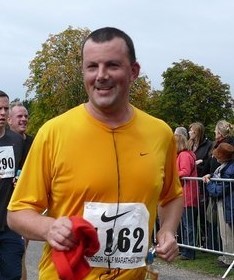Over stride in runners
Posted on 6th May 2019 at 16:22
Over stride in runners occurs when the foot (usually heel) strikes the ground a reasonable distance away from the body’s centre of gravity, increasing leverage between ground force and the centre of the body.
Common observations made when a runner is over striding are heel strike away from the body with increased upward flexion of the ankle and landing with a straighter knee. These positions if repeated can cause anterior shin or knee and foot pain and increased strain on the hamstring tendon attachments at hip or knee.

As mentioned in my previous blog (Running injuries, Running shoes and Running styles) the body will self optimise to the style of running you choose so over stride does not necessarily need to be corrected. However if you do over stride and are experiencing symptoms in your lower limb correcting over stride or teaching yourself to run for periods with less over stride may give the body time to recover and adapt without having to stop running all together.
It is important when trying to correct over stride that you do not complicate things and maintain a fluid style. A simple cue like trying to run with a higher knee lift or pretending you are trying to run over long grass can allow the leg more time in the air so that your full stride length is completed in the air and the foot will be naturally moving back to the body before it hits the ground.
Running on a treadmill set at the same speed as you normally do but trying to increase your step rate by 5-10% can also help reduce over stride.
When implementing changes to your running style it is important that changes are introduced gradually. I recommend to my clients that these should be for about 60 seconds of every mile run. Once you get used to the new style then it is up to you as whether you want to graduate to the new style completely or use it as a tool periodically to reduce load associated with your usual running style.
Craig Fowlie
Senior Physiotherapist
MSc Sports and Exercise medicine (Distinction) BPHTY(Hons), MCSP, MAACP
Member of the HCPC
Colchester Physiotherapy and Sports Injury Clinic
Author
Craig Fowlie

Craig is a highly specialized physiotherapist with post graduate qualifications in Acupuncture and Sports and Exercise Medicine.
He has worked with Professional Rugby sides in New Zealand and has assisted Great Britain Table Tennis at the World Team Championships and Olympic Qualifiers in Qatar and Germany. He is a consultant for the Governments Talented Athlete Scholarship Scheme and has published and presented research in the Journal of Physiotherapy and the Chartered Society of Physiotherapy Annual Conference.
Outside of work he enjoys participating socially in triathlon and running.
Share this post:






